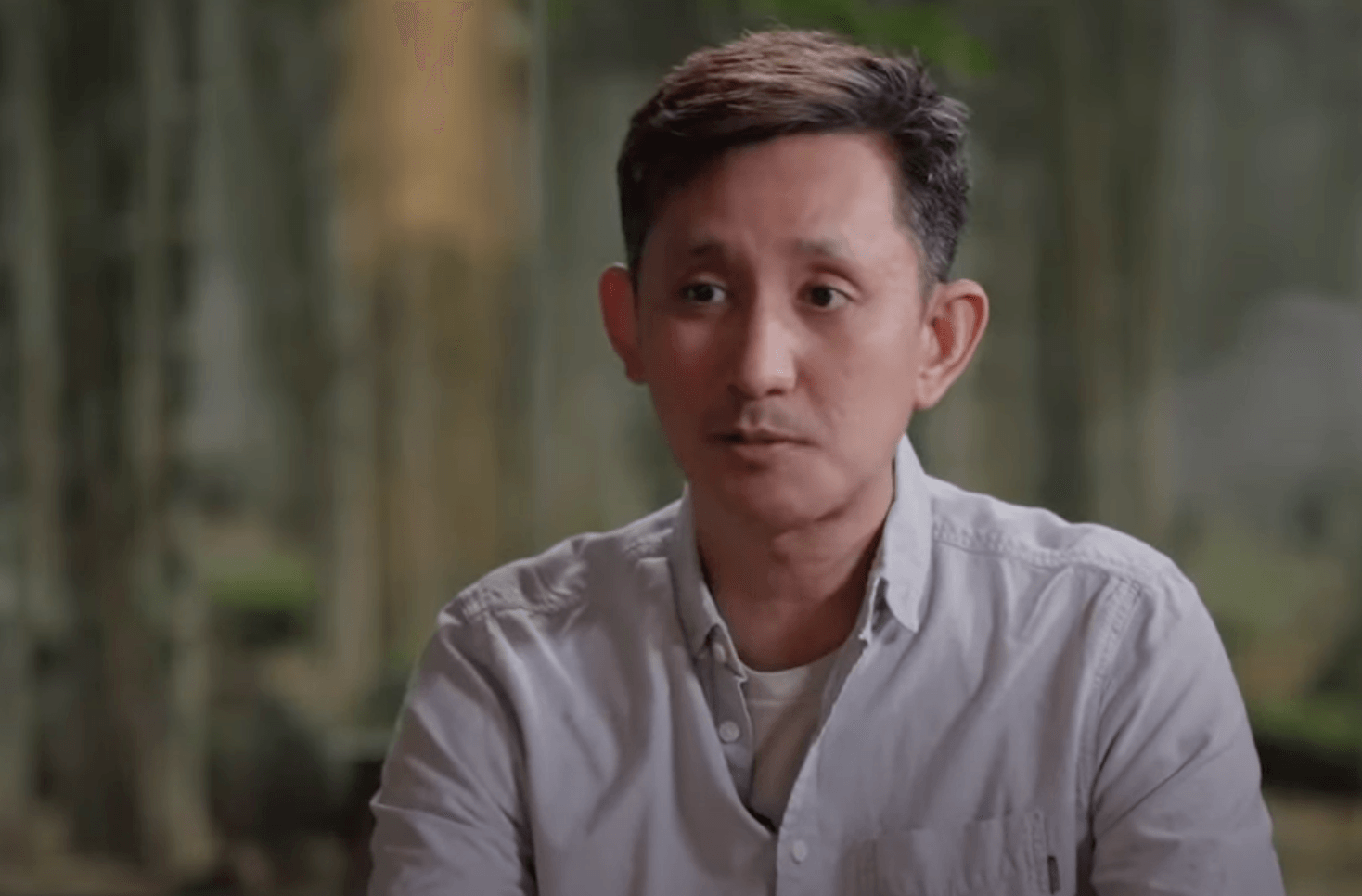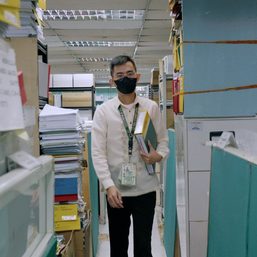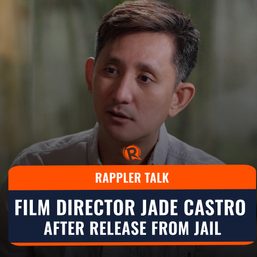SUMMARY
This is AI generated summarization, which may have errors. For context, always refer to the full article.

As an acclaimed film director, Jade Castro is familiar with bizarre things that usually happen in a movie plot. Little did he know that his life would be as shocking as some of the films he had directed.
Castro and his friends – Ernesto Orcine, Noel Mariano, and Dominic Ramos – were detained for over a month and adjusted to life inside a detention facility. Inside their small space, they could only do a few things: eat, play board games, and dance the zumba.
The four were arrested without a warrant in Catanauan, Quezon province on February 1 for allegedly burning down a modern jeepney.
Fast forward to the afternoon of March 11, Castro thought of cleaning his fingernails. He had yet to finish cleaning his hands when one of the jail officers handed them four pages. Castro had a feeling it was something related to their release, he told Rappler, so he immediately read the document.
When one of his friends shouted for joy, Castro knew at that moment that his gut feel was right. The document was their release order, following the court’s decision dismissing the destructive arson charge against them.
Castro said the four of them hugged as finally, they would be freed after 40 days. They left the detention facility on March 11 and immediately traveled back to Metro Manila to meet their family, except for Orcine, who chose to stay with his family in the province.
The alleged crime was committed on January 31 in Catanauan town, less than an hour away from Mulanay town, where Castro and his friends were staying for a vacation. A closed circuit television (CCTV) footage showed Castro and his friend’s car passing through a Mulanay road at around 7 pm on January 31, around the same time the crime was committed in Catanauan.
Another CCTV footage showed that at around 7:25 pm of the same night, Castro was filming the rehearsal of a local pageant in Mulanay town plaza. Two Mulanay town officials said that they were with Castro and his friends when the alleged crime happened in the other town.
Castro’s arrest did not just ignite the spirit of unity in the entertainment and film industry, but also brought renewed criticisms about how the police handle warrantless arrests and hot pursuit operations.

A systemic problem
When they were being arrested, Castro said it did not occur to him then that it wasn’t because of his work as a cultural worker, but because he was an ordinary person.
“Ang tingin po namin, hindi kami tinarget…Kung hindi dahil nandoon kami at naisip nilang ituro kami… Hindi dahil kami ay mga professional o kami ay kilala, kung hindi dahil ordinaryo kami (We believe we were not targeted. We were arrested because we were there so they thought of pinning us. Not because we were professionals or prominent, but because we were ordinary citizens),” Castro said in a separate press conference.
“It says several things. Ito’ng nangyari sa amin (What happened to us) says several things. One is that it happens, it has been happening, and it will probably happen again,” he told Rappler.
Castro expounded on the reason why he thinks they were arrested. Inside the detention facility, Castro and his friends met people who, like them, were victims of illegal and unlawful arrests. The persons deprived of liberty (PDL) were ordinary citizens – among them a tricycle driver and a factory worker, he added.
Castro said his experience and conversations with fellow PDLs made him realize how the justice system works, and how the police operate in far-flung areas. He saw how some PDLs suffer and remain detained even though the cases against them were not strong or should not have prospered in the first place. These were on top of unlawful arrests.
“There’s a lot of systemic flaws. Our enforcers rely too much on testimony, even with the absence of physical evidence. Probing a case, like in other countries, should be evidence-based. This means the probe should be backed by science. The case will not prosper if there’s no really strong evidence,” human rights lawyer Chel Diokno, who is also part of Castro’s legal team, said.
The problem with warrantless arrest, waiver
Diokno reiterated that a warrantless arrest should be done as a last resort. Unfortunately, this has become the “default option” of the country’s law enforcers, which has led to abuses, he said.
Under the Rules of Court, a person may only be arrested without a warrant if he or she is caught in the act, if there’s probable cause to believe that a crime was committed, or if the person is a fugitive. Hot pursuit – the justification behind Castro’s arrest – is done under the second category, or when there is probable cause.
Calabarzon regional police director Police Brigadier General Paul Kenneth Lucas earlier told Rappler that there was probable cause because witnesses – the driver and the conductor of the burned vehicle – had identified Castro and his friends.
During the trial, it turned out that the witnesses did not actually point to Castro and his friends. They gave police descriptions of the individuals who burned their vehicle. A “dragnet operation” followed, which entailed police going to Micasa resort where the four were staying, photographing them, and bringing back the photos to the witnesses who then said they were the perpetrators.
For Catanauan Regional Trial Court Branch 96 Presiding Judge Julius Francis Galvez, that was not a valid hot pursuit, because in the first place, police had “no probable cause or reasonable suspicion to go to the Micasa resort to conduct a follow-up operation, and then, to take pictures of the four accused.”
Photographing Castro and his friends and showing those photos to the witnesses were “contrary to the constitutional rights of the four accused against reasonable arrest,” said Galvez.
“The validity of the arrest of the four accused cannot be sustained outright on mere witnesses’ actual identification of them at the police station, in view of the foregoing explanations,” the 16-page decision read.
As a result, the court said it cannot acquire jurisdiction or hold the four on trial, so it granted the accused’s motion to quash that dismissed the case.
The four’s arrest also surfaced another legal concern – the problem with waivers during inquest. Warrantless arrests go through inquest proceedings, an expedited type of preliminary investigation, as the detainees are held without a warrant. Under the Revised Penal Code, a person arrested without a warrant should be brought to court within a maximum of 36 hours – and this is already for grave violations.
DOJ spokesperson Assistant Secretary Mico Clavano earlier said that the film director and his friends waived their rights to undergo inquest proceedings under Article 125 of the Revised Penal Code “in order to submit a counter-affidavit where the prosecutor will evaluate their defenses.”
Castro, however, said they were not properly informed about the implications of signing the waiver. They were only told that if they sign the waiver, they would have a chance to explain themselves through the submission of their counter-affidavit.
Lawyer Carmela Peña, one of Castro’s legal counsels, earlier told Rappler that although their clients signed the waiver, it was not informed consent. The counsels were not yet involved in the preliminary investigation, and they got on board only on February 5.
“By without ‘informed consent’ it means these tourists may not have been fully informed of the consequences or effects, or they may not have fully comprehended what the waiver of Article 125 is,” Peña said.
If someone who is arrested without a warrant waived his or her right to undergo inquest proceedings, as Castro did, the case undergoes regular preliminary investigation. This means the 36-hour rule will no longer be applicable, and the prosecutor will decide on the complaint without a strict deadline. In the case of the four, this would delay their freedom because they will have to wait for the prosecutor’s resolution.
“I think, this problem could be easily resolved if the Secretary of Justice will give a directive that during inquest, prosecutors should explain that when a person signed the waiver, it’s an acceptance that it’s okay for them to be detained while the preliminary investigation is ongoing,” Diokno said.
Battle not over
The judge’s decision, however, left a small window for the police to still pursue the case. As Galvez wrote: “This ruling does not foreclose the build-up of [Catanauan police] to determine the involvement of the four accused. This ruling cannot be interpreted as a resolution of this case on the merits which can be further strengthened by the [Catanauan police] and the prosecution thru a regular preliminary investigation.”
The PNP Calabarzon has made it clear that it will still pursue the case against the four.
In the event that the case is refiled, it will not constitute double jeopardy since their case did not reach arraignment. Arraignment is when “the judge reads the charges filed against the defendant in the complaint and the defendant chooses to plead ‘guilty,’ ‘not guilty’ or ‘no contest’ to those charges.”
Castro told Rappler that he has yet to process this announcement by the regional police. But regardless, he said he is not afraid because he has the support of his family, friends, and legal counsels.
“Ang hope ko na lang is, maliwanagan sana sila at makita nila na hindi naman kami ‘yong gumawa. At tuwing ipu-push nila na kami ‘yong gumawa, mayroong totoong gumawa no’ng krimen na nando’n lang sa labas somewhere na dapat sila ‘yong iniimbestigahan. Hangga’t dinidiin nila kami, hindi ito magkakaroon ng totoong hustisya kasi hindi talaga kami ‘yong gumawa,” he said.
(My hope is the police will be enlightened and will see that we are innocent. Every time they push us as suspects, the true suspects will continue to evade the probe. As long as they pin us, this case will not lead to justice because we are really innocent.)
On the possibility of filing counter complaints against the police who unlawfully arrested them, Castro said that they have yet to discuss this.
The cops tagged in the arrest – Police Captain Daniel dela Cruz, Police Senior Master Sergeant Jonjon Pordan, and Police Corporal Christian Abenilla – already face a less grave misconduct case over the director’s unlawful arrest. The PNP Internal Affairs Service (IAS), mandated to go after erring cops, filed this administrative case motu proprio, or on its own.
However, even if the cops are found guilty in this administrative case, it usually takes months or even years before they are sanctioned. In case an adverse ruling is issued by the IAS, the cops can stall by filing an appeal. – Rappler.com
Some quotes were translated into English for brevity
Add a comment
How does this make you feel?










There are no comments yet. Add your comment to start the conversation.